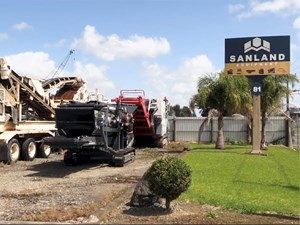Comment: Fuel theft—a growing concern
Fuel theft is a growing concern for the trucking industry
Latest police data shows about 1300 fuel thefts are reported each month. This is mainly due to drive-offs from retail fuel outlets, but it gives you an idea of the scale of the problem.
For the average trucking operator, fuel accounts for 30% of their total operating costs, so it’s critical that trucking operators monitor their fuel consumption closely, as an unbudgeted increase in fuel consumption can have a dramatic effect on your bottom line.
Unfortunately, with the increasing cost of fuel to all road users, the theft of fuel is becoming an increasing issue for many in the trucking industry.

Fuel theft can take many forms, from the highly publicised cases where organised criminal gangs steal thousands of litres in one hit, to the opportunist thefts and to the less visible forms of theft from within your own business.
There are a number of measures that you can put in place to minimise the risk of fuel theft in your business, ranging from reviewing your fuel security measures to putting in place efficient fuel monitoring practices.
Fit locking fuel caps to vehicles. Seems like a basic idea, but this first line of defence is well worth the effort, as anything that slows down a potential fuel theft, is likely to reduce the risk.
Fit anti-siphon devices. There are a number of products on the market now that can be inserted in the neck of the fuel tank that eliminates the possibility of fuel being siphoned out. This will not stop a determined thief who drills a hole in your tank but it will certainly slow them down.
Educate your drivers. If you’ve not already done so, then instigate a process of daily pre-trip inspections for your drivers. This should include a check of the fuel gauge reading against that recorded when the vehicle was parked up. Not completely fool-proof but this will certainly raise a red flag if there’s a huge discrepancy and will allow you to follow-up sooner rather than later.
For years, we’ve been telling our drivers to top their fuel tanks up at the end of the day to avoid condensation in the fuel tank. This is good practice, but if the vehicle is going to be parked up away from a secure yard for the night, it may well be better off leaving the fuel top-up till the next morning. If the fuel tank is close to empty, then there’s not much opportunity for fuel theft. Educate your drivers about the consequences of fuel theft.
Park your vehicles in a secure yard. The best place to park a truck at night is in a secure yard, with security fencing and gates, good lighting, security cameras, and better still, with swipe card access that records the details of all entries and exits. This makes it harder for the opportunist thieves. An unsecured yard is inviting theft and dishonesty.
Increase fuel card security measures. This is an area where a significant number of trucking operators can make improvements. Start by setting the fuel cards up so that they are assigned to a particular vehicle.
Restrict purchases to fuel only (and only for the type of fuel used by that particular vehicle). Set the fuel card up with a daily purchase limit and a limit to the number of transactions per day. Set up cards to only allow purchases at particular sites. If the vehicle normally runs between Christchurch and Dunedin but suddenly the card is used to make a purchase in Rotorua, then chances are the card has been stolen.
Cards should only operate by PIN number, and this should not be left with the vehicle, or worse still, written on the fuel card or fuel cardholder. Set cards up to require a fleet/registration number and mileage recording to allow the transaction to be completed.
Instruct your drivers to correctly enter information. Don’t leave fuel cards in vehicles but assign to drivers at the start of each trip or workday.
GPS-based telematics systems. These are becoming a must-have technology for trucking operators, especially when it’s paired with a whole telematics-based system that controls Road User Charges purchases, monitors fuel consumption, engine management, and driver behaviour.
A powerful tool if the system is set up correctly and you’ve taken the time to understand the various reporting abilities of the system.
Many GPS systems give you the ability to link fuel purchases with the actual location of the vehicle at the time of fuel purchase, thereby assisting in identifying fuel theft. GPS reports make it easy for trucking operators to compare actual vehicle fuel usage against expected use. If the vehicle normally returns 2.2km per litre on a particular delivery run but has recently only been achieving 1.85km per litre, then you’re in a good position to investigate further.
Implement a fuel management system. Recording accurate data is the key to any successful system. If your vehicles are fitted with GPS systems, then you’re half-way there. If you’re still running manual recording systems, then all is not lost. You need to cover the basics.
On your drivers daily log sheets, have your drivers record their daily start and finish distance readings, along with details of all fuel purchases. These should include copies of all fuel purchase receipts. If they are running auxiliary power units for refrigeration, etc., then have your drivers make these as separate purchases, with separate receipts. From this data, you should be able to work out normal fuel consumption and purchase patterns.
Look out for smaller-than-usual fuel purchases or multiple purchases on the same day. Then you can compare fuel use between similar vehicles doing similar work and look for and monitor for any discrepancies. If you find any, investigate further. It may be down to a maintenance issue, but it may also be down to some form of fuel shrinkage. Either way, you need to have the information to follow through.
Have regular toolbox meetings with employees. If you’ve had fuel theft issues, holding a meeting and telling your employees that there has been fuel theft will make your good employees more vigilant and will also send a clear message to employees that may have not been honest that you’re on top of the issue. For most employees, taking advantage of the business to get free fuel is not worth losing their job over.
Do thorough background checks on new employees. This may seem like a basic procedure for a trucking operator, but you would be surprised at the number of trucking operators that don’t get thorough background checks completed on new employees. A couple of phone calls, which red flag any historical issues, can save you a multitude of grief further down the track.
Keep up to date in the industry by signing up to Deals on Wheels' free newsletter or liking us on Facebook.




.jpg)


.jpg)









